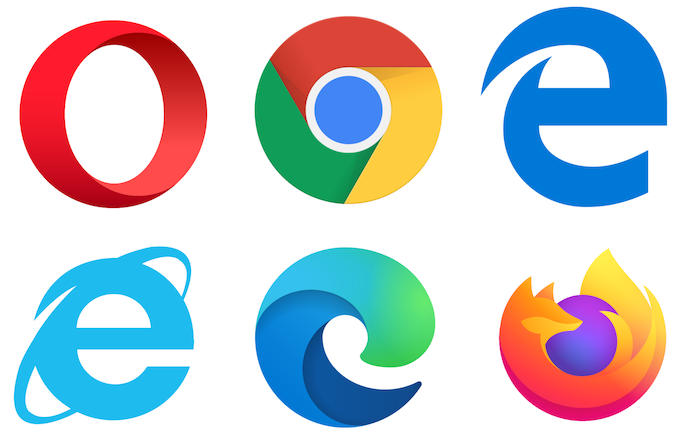The 2020 Browser Battle: Surfing With Speed
by Brett Howse on September 10, 2020 8:00 AM EST- Posted in
- Software
- Browsers
- Mozilla
- Google Chrome
- Microsoft Edge

Accessing the internet is one of the most basic tasks for any computer, but webpages in 2020 are incredibly complex so how the browser interprets the code and renders it as a viewable webpage is no simple task. Modern browsers have both a rendering or layout engine, as well as a scripting engine, and both factor into how well the browser can handle any particular task.
When the web first evolved, it was more or less a static affair, with webpages laid out in HyperText Markup Language, otherwise known as HTML, but as time passed websites became more and more complex, with it not uncommon today to run applications that would have been compiled programs several years ago. As such, browser performance is still an especially important metric for any PC user.
For 2020, the browser landscape has been shaken again, with Microsoft abandoning their closed source browser and moving over to the open source Chromium project, which as the name suggests, is the basis for the popular Google Chrome browser. After being in development for over a year, Microsoft has started updating Windows 10 PCs from Edge based on EdgeHTML to the Chromium Edge. As such, we figured it was a good chance to take stock of the browser landscape and see how some of the more popular browsers fare in terms of performance and battery life.
Although the web is based on HTML, with a standards body approving changes to the base HTML and therefore a level playing field, over the years it has never worked out quite as well as hoped, with web developers focusing on particular browsers that are popular or they are comfortable with, so over the years we have seen quite a few periods where specific browsers have been favored over others. Most readers will likely remember the days of Microsoft’s Internet Explorer 6 dominance, where websites would often only work in IE 6 thanks to heavy use of ActiveX. Internet Explorer has been a dominant feature of business and enterprise intranet sites, to the point where Microsoft is still forced to include and update their ancient browser even as they would like to move on. But that was certainly not the only time that has happened. Microsoft had the shoe on the other foot with the rise of mobile computing, where Webkit was the predominant browser thanks to Apple’s Safari browser on iOS, and Google using Webkit as the basis for Chrome as well.
What this means is that the web landscape, despite being open thanks to a standards body, has never felt as open as it could have been. One dominant platform or another has tended to be the one to drive developers to utilize new features that may not yet be ratified as web standards, or not yet supported by other browsers. So, although there is likely a group of people happy to see Microsoft abandon their own browser engine and move to Chromium, for the web it is not necessarily a net positive to see so much consolidation.
Today’s web landscape heavily favors browsers based on Chromium, which of course includes Google Chrome, but also the new Microsoft Edge, as well as Opera, Vivaldi, Brave, and quite a few more. Mozilla Firefox is the rare exception, with Mozilla developing their own browser engine in Gecko with Spidermonkey for scripting. Apple continues to offer Safari with Webkit, of which Chromium forked into Blink back in 2012.
| 2020 Web Browser Comparison | |||||
| Name | Rendering Engine | Scripting Engine | Version Tested | ||
| Google Chrome | Blink | V8 | 84 | ||
| Microsoft Edge Classic | EdgeHTML | Chakra | 18 | ||
| Microsoft Edge Chromium | Blink | V8 | 85 | ||
| Mozilla Firefox | Gecko | SpiderMonkey | 79 | ||
| Opera | Blink | V8 | 70 | ||
| Internet Explorer | Trident | Chakra (JScript) | 11 | ||
| Apple Safari | WebCore | JavaScriptCore | Not Tested | ||
Although each browser has their own advantages in terms of features, design, and privacy, today we are going to just focus on how each browser performs. When an application is run on your desktop, most of the time it is going to be code that is written, then compiled. On the web, the code is not compiled, and instead the browser relies on its ECMAScripting engine to perform Just-In-Time (JIT) compilation. Because of this, browser performance is heavily impacted by how that scripting engine performs. We have seen advances in the scripting engine improve browser performance over time, as well as sometimes finding degradation as the engine is updated. And, of course, from time to time we have seen various vendors add specific code to deal with popular scripting benchmarks of the day.
The other side of the equation is battery life, meaning how efficient the browser and scripting engine is. The decline of the desktop has been happening for years with laptop sales continually outpacing desktops, so more battery life from your browser is likely a welcome addition.
For this test, we will be focusing on some of the more popular browsers available on the PC. As more of them consolidate around Chromium, we figured it was a good chance to look at how each browser performs, as well as look at the outgoing Microsoft Edge and even Internet Explorer to see if Microsoft has had to sacrifice performance during this transition.











121 Comments
View All Comments
Gigaplex - Thursday, September 10, 2020 - link
If we get complacent and stop testing, the quality will go downhill.TheJian - Sunday, September 13, 2020 - link
ROFL. That already happened. It's why I'm still on firefox 50's (ESR stopped at ~53.x before jumping to BS new versions). A browser without multi-row tabs in 2020? WTF? You all failed. Firefox=chrome now...Again, firefox, you failed to realize who you are. DIFFERENT, CUSTOMIZATION. Now, you're just chrome lite, I mean, chrome sh!te. LOL. My family hasn't ENJOYED the web since firefox gave up. Dad's on opera now (minor complaints, he just suffers through with lots of groaning all day), moms on new firefox (accidently updated) and wants to kill her PC, and I'm on old firefox which even rottentomatoes is attacking now as not being supported...WTF do you care about my browser for anyway RT? RT is just the new GAY IMDB now anyway as if IMDB didn't own that title lock stock and barrel already. We need a new TV site...LOL. But yeah, start doing browser articles on how each has destroyed their users fun. Start doing articles highlighting what they are NOT doing, as what they ARE doing sucks already and I have no need to read about how much worse they're getting. I can see that daily. They all suck now.lioncat55 - Monday, September 14, 2020 - link
Man, who hurt you. Your family can't enjoy browsing the web now? WTF is that. Unless your compiling your own browser, most people don't remotely care about the browser they use.Also, stacked tabs? F that, that just adds on more tool bars, what are you using a 800x400 crt, do you want your browser window to be 80x400 with all the old tool bars.
Carmen00 - Friday, September 11, 2020 - link
Definitely not! The browser wars are still ongoing, and I hope that there will continue to be choice in the browser world. We've seen the terrible things that happen to standards and software when a single dominant browser decides to do its own thing, just because of its market position ... looking at you in particular, IE and Chrome. I hope that we never end up in a "Best Viewed With Browser X" scenario again — and if you don't know what I'm talking about here, thank your lucky stars. But with choice comes the necessity of seeing how good all the choices are, and this article is exceptionally useful in that regard.From the article,
"There was a years-long PR war with Microsoft begging developers to write websites to standards and features, rather than just based on a User Agent String, but that war was lost, and in a surprising, but also necessary move, Microsoft abandoned its browser and joined the Chromium gang."
Now, for those of us who remember (and had to code for) the IE6 days, this "write standard code" attitude from Microsoft was preceded by YEARS of completely ignoring the standards and telling developers to suck it up and ONLY write for IE6. They trained devs to look at the user-agent string. They created the problem, and ironically, they're the ones who had to abandon their own technology because of it!
lmcd - Friday, September 11, 2020 - link
Microsoft abandoned its browser way before then, when the Windows team or whoever is above them decided the Edge team should be stuck on a 6-month release cycle with no backports to old Windows 10 feature versions.grant3 - Sunday, September 13, 2020 - link
Would you mind clarifying: is it your opinion that it's GOOD or that it's BAD for a dominant browser engine to ignore web standards and force developers to look at user-agent strings?Or is it only bad in 2001, but good in 2020?
Or is it only bad when Microsoft does it, but good when Google does it?
Carmen00 - Sunday, September 13, 2020 - link
?? It's bad, period. Developers should never have to look at user-agent strings. What part of my post made you think that I think it's a good thing?It's just funny and ironic that it's Microsoft who made the problem and is now decrying it.
Lord of the Bored - Sunday, September 13, 2020 - link
Before Internet Explorer, we had "best with Netscape Navigator". Only diffrence was scripting to detect useragent wasn't really possible, so we put animated buttons in to make sure people knew what they were supposed to run.flyingpants265 - Saturday, September 12, 2020 - link
Firefox is clearly faster than Chrome but I don't understand why the UI sucks so bad. Just give us the option to make the UI identical pixel-for-pixel to Chrome, and I'll switch to FF instantly.JfromImaginstuff - Tuesday, September 15, 2020 - link
Well there some themes that you could use if all you're after is looks else I don't know